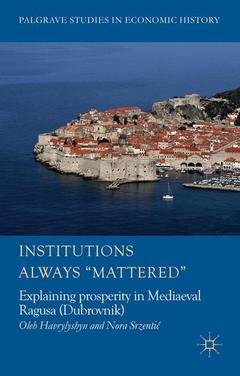Institutions Always 'Mattered', 2014 Explaining prosperity in Mediaeval Ragusa (Dubrovnik) Palgrave Studies in Economic History Series
Langue : Anglais
Auteurs : Havrylyshyn O., Loparo Kenneth A.

The medieval Republic of Ragusa (now Dubrovnik) was a prosperous small open economy, rivalling bigger competitors. This study collects together evidence on how Ragusa compared to other economies of the region, and addresses the difficult question of why it outperformed its Dalmatian rivals (Kotor, Split and Zadar).
PART I: OVERVIEW OF BOOK 1. Introduction 2 . Key Aspects of The New Institutional Economics (NIE) PART II: ECONOMIC HISTORY OF RAGUSA/DUBROVNIK 3. History of Ragusa in Eastern Mediterranean Context 4. Economic Evolution and Rise to Prosperity 5. Quantifying Ragusan Prosperity and Disproportionate East Mediterranean Role 6. The Relative Decline after Vasco da Gama Circumnavigation PART III. PRUDENT MACROECONOMIC POLICIES 7. The System of Governance , Wise Policies , and Market-Friendly Institutions 8. Macro Policies 1: Fiscal Probity the Starting Point for Good Institutions 9. Macro Policies 2: Monetary and Financial Prudence , Minimal Public Debt PART IV. GROWTH-PROMOTING INSTITUTIONS 10. Institutions Friendly to Commerce- in today's jargon 'Ease of Doing Business' 11. An Open Legal System with Effective Rule-of-Law 12. 'Sufficient ' Social Fairness Provides Stability 13. Maximal Diplomacy with Minimal Military PART V. CONCLUSIONS 14.How Unique Was Ragusa? Some Comparison with Venice and Others 15. A Successful Case of Institutional Optimality Before its Time: What lessons for the 21st. century?
Oleh Havrylyshyn is Adjunct Professor at The George Washington University. After a long academic career he became Deputy Minister of Finance in the first Ukrainina Government, then its representative at the Board of the International Monetary Fund. He has written widely on transition and has been a consultant to various governments, the World Bank and other international agencies. A native of Ukraine, he has travelled and worked extensively in Eastern Europe and the former Soviet Union. He is the author of Divergent Paths in Post-Communist Transformation (Palgrave Macmillan, 2006).
Nora Srzenti? obtained a PhD in Economics in 2013 at the department of Financial Economics (Ghent University), where she was a doctoral researcher. Previously she performed various duties within commercial banking, including market risk management and lecturing on banking regulation topics. Her current interest lies in central banking.
Nora Srzenti? obtained a PhD in Economics in 2013 at the department of Financial Economics (Ghent University), where she was a doctoral researcher. Previously she performed various duties within commercial banking, including market risk management and lecturing on banking regulation topics. Her current interest lies in central banking.
Date de parution : 12-2014
Ouvrage de 252 p.
14x21.6 cm
Thèmes d’Institutions Always 'Mattered' :
© 2024 LAVOISIER S.A.S.



